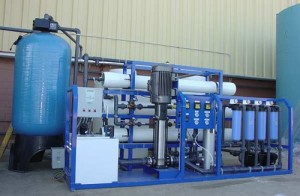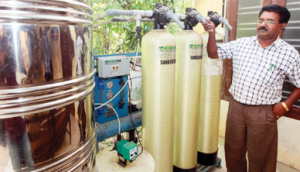
Reverse osmosis plant in remote villages for clean potable water
Residents of Kuttanad in Kerala where clean potable water was scarce although surrounded by water bodies who ran out of funds, Dr S Sajith Kumar associate professor at the Community Medicine Faculty of Alappuzha Medical College came to the rescue and installed Reverse Osmosis plant and helped 500 families and 13 local authorities (Panchayats).
Reverse Osmosis plant is a membrane technology filtration system that removes many types of large molecule and ions from solutions applying pressure to the solution, when it is on one side of the membrane. The solute is retained on the pressurised side of the membrane and pure solvent is allowed to pass to the other side. The membrane would allow smaller components of the solution such as the solvent to pass freely. This process will purify water and remove salts and other impurities in order to improve the colour, taste and properties of the fluid.
The plants are now managed by panchayats and one litre of pure water costing no more than one paise (1 pence) . A few panchayats charge 20p per litre, which includes the cost of guarding the plant, while other offer water free of cost.
Then Chief Secretary K Jayakumar asked Sajith Kumar whether he could take it up. Amidst his hefty workload in hospital, Sajith Kumar accepted the challenge. Initially, Rs 5.67 crore £70m was earmarked for the project. However, the amount came down to Rs 3.15 crore £39m, when he undertook it. He envisaged a plan to install 63 plants in 13 local authorities, out of which 60 have been accomplished and they are working on the last 3 locations in consultation with local politicians. .


